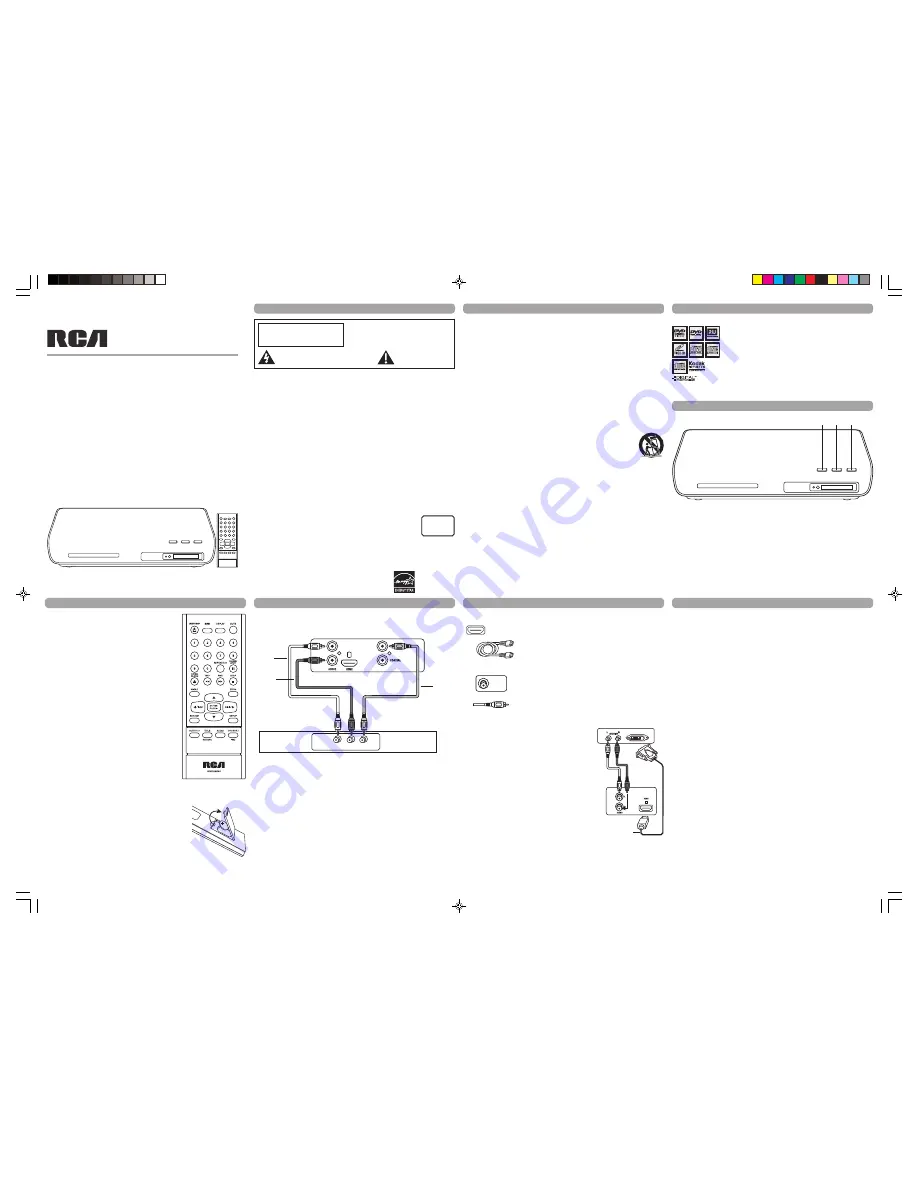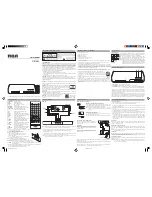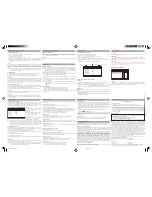
user
manual
DRC282
Basic Connection
Playing Discs
Front panel Controls
IMPORTANT SAFETY INSTRUCTION
It is important to read this instruction prior to using your new product for the first
time.
Remote Control
DVD + TV
Note: Whenever you are connecting your system cables, turn off the power and make
certain that the power cord has been removed from the wall outlet.
1. Connect the audio cables to the AUDIO L and R jacks (red and white) on the back of
your DVD player and to the corresponding AUDIO INPUT jacks on your TV.
2. Connect the video Cable.
Basic connection – Connect the video cable to the VIDEO OUT jack (yellow) on the back
of the your DVD player, and to the VIDEO INPUT jack on your TV.
Note: If your TV doesn’t have Audio and Video Input Jacks and only has an RF jack, you
need to connect an RF modulator (not provided).
This DVD player is designed and manufactured to respond to the Region Management
Information. If the Region number of a DVD disc does not correspond to the Region
number of this DVD player, this DVD player cannot play the disc. The Region number
for this DVD player is Region No 1.
This product incorporates copyright protected by U.S. patents and other intellectual
property rights. Use of this copyright protection technology must be authorized by Macro-
vision Corporation, and is intended for home and other limited consumer uses only unless
otherwise authorized by Macrovision. Reverse engineering or disassembly is prohibited.
1. OPEN/CLOSE – Opens and closes the disc tray.
2. PLAY/PAUSE – Starts playing a disc, freezes or unfreezes playback.
3. ON/STANDBY / STOP – Press the button to turn on the unit / Press and hold 3 seconds to
go to standby mode / Press the button to stop disc playback.
1. Read these Instructions.
2. Keep these Instructions.
3. Heed all Warnings.
4. Follow all instructions.
5. Do not use this apparatus near water.
6. Clean only with a dry cloth.
7. Do not block any of the ventilation openings. Install in accordance with the manu-
facturer’s instructions.
8. Do not install near any heat sources such as radiators, heat registers, stoves, or
other apparatus (including amplifiers) that produce heat.
9. Do not defeat the safety purpose of the polarized or grounding – type plug. A polarized
plug has two blades with one wider than the other. A grounding type plug has two
blades and a third grounding prong. The wide blade or the third prong are provided
for your safety. If the provided plug does not fit into your outlet, consult an
electrician for replacement of the obsolete outlet.
10. Protect the power cord from being walked on or pinched particularly at plugs,
convenience receptacles. and the point where they exit from the apparatus.
11. Only use attachments/accessories specified by the manufacturer.
12. Use only with a cart, stand, tripod, bracket, or table specified by the
manufacturer, or sold with the apparatus. When a cart is used, use
caution when moving the cart/apparatus combination to avoid injury
from tip-over.
13. Unplug this apparatus during lightning stoms or when unused for long
periods of time.
14. Refer all servicing to qualified service personnel. Servicing is required when the
apparatus has been damaged in anyway, such as power-supply cord or plug is
damaged, liquid has been spilled or objects have fallen into the apparatus, the
apparatus has been exposed to rain or moisture, does not operate nonnally, or has
been dropped.
Portable Cart
Warning
IMPORTANT SAFETY INSTRUCTION
FCC INFORMATION
NOTE: This equipment has been tested and found to comply with the limits for a Class B
digital device, pursuant to Part 15 of the FCC Rules. These limits are designed to provide
reasonable protection against harmful interference in a residential installation. This equipment
generates, uses and can radiate radio frequency energy and, if not installed and used in
accordance with the instructions, may cause harmful interference to radio communications.
However, there is no guarantee that interference will not occur in a particular installation.
If this equipment does cause harmful interference to radio or television reception, which can
be determined by turning the equipment off and on, the user is encouraged to try to correct
the interference by one or more of the following measures:
• Reorient or relocate the receiving antenna.
• Increase the separation between the equipment and receiver.
• Connect this equipment into an outlet on a circuit different from that to which the receiver
is connected.
• Consult the dealer or an experienced radio/TV technician for help.
WARNING: Changes or modifications to this unit not expressly approved by the party
responsible for compliance could void the user's authority to operate the equipment.
This class B digital apparatus meets all requirements of the Canadian Interference–Causing
Equipment Regulations.
The Shock Hazard Marking and Associated Graphical Symbol is provided on the bottom panel
of unit.
Refer to the identifi cation/rating label located on the back panel of your product for its proper
operating voltage.
CAUTION: This product utilizes a laser. Use of controls or adjustments or
performance of procedures other than those specified herein may result
in hazardous radiation exposure. Do not open covers and do not repair
yourself. Refer servicing to qualified personnel.
This product complies with DHHS Rules 21 CFR Subchapter J. Applicable at the date of
manufacture.
IMPORTANT: The power cord can be unplugged to turn off the main power to the unit. It
should also be easily accessible in an emergency.
• Leave sufficient space around the appliance to allow adequate ventilation: 10cm on either
side and at the back, as well as 7cm above it are ideal.
WARNING: To reduce the risk of fire or electric
shock, do not expose this apparatus to rain or
moisture.
This symbol indicates “dangerous voltage”
inside the product that presents a risk of
electric shock or personal injury.
This symbol indicates
important instructions ac-
companying the product.
WARNING
RISK OF ELECTRIC SHOCK.
DO NOT OPEN
To reduce risk of electrical shock, do not
remove cover or back (no user serviceable
parts inside). Refer servicing to qualified
personnel.
Basic Connection
Other Connection Options
HDMI (High-Definition Multimedia Interface)
The HDMI jack provides optimum picture quality. This jack gives
you an uncompressed digital interface that carries both video and
audio data by way of an integrated mini-plug cable.
Note: Make sure you set the HDMI Setup option in the menu
system to the resolution setting that most closely matches
your TV.
DIGITAL OUT COAXIAL (Audio)
Use the Coaxial Output jack to connect your DVD player to
Dolby Digital receiver or decoder.
Use the Coaxial cable (not supplied) for the above connection.
Coaxial Digital Out
COAXIAL
Coaxial Cable
HDMI Cable
Connecting TV with DVI input
Please get a HDMI to DVI cable (not supplied) to
connect your DVD player to a TV or monitor with
a DVI input jack.
IMPORTANT:
Since DVI connections do not carry audio, you will
need to connect the DVD Player’s AUDIO jacks to
your TV’s audio input jacks to hear the audio from
the DVD Player.
You can also use the digital coaxial output jack to
connect the DVD player to an audio receiver with
digital input jack.
HDMI and High-Definition Multimedia Interlace are trademarks or registered trademarks
of HDMI Licensing LLC.
Manufactured under license from Dolby Laboratories. “Dolby” and the double-D symbol
are trademarks of Dolby Laboratories.
Windows Media and the Windows logo are trademarks or registered trademarks of
Microsoft Corporation in the United States and/or other countries.
Basic Playback Operations
Turn on the DVD Player
1. Plug the power cord into the outlet once the DVD player is connected to your TV.
2. Turn on the TV and tune to its Video Input Channel, if necessary.
3. Press the ON/STANDBY button on the DVD player or the ON/STANDBY button on the
remote control to turn it on.
4. Press the OPEN/CLOSE button on the front of the player or remote control to open the
disc tray.
5. Place a disc gently into the tray with the disc’s label facing up (double-sided discs have
content on both sides, so you can place the disc with either side up.)
6. Press OPEN/CLOSE again to close the disc tray. Play starts automatically. If a menu
appears, one of its options can be selected to start playing the disc. Highlight it and
press ENTER/PLAY
4
.
7. Press STOP to stop playback. The player remembers the point where disc was stopped.
If you press PLAY again, playback resumes from this point. To stop playback
completely or to start again from the beginning, press STOP twice. If the player is left
in STOP mode for more than five minutes without any user interaction, the screen
saver is activated.
Picture Scan
While a disc is playing, press FWD or REV repeatedly to scan the disc faster until you
reach the fastest scan speed. To resume normal playback, press ENTER/PLAY
4
or
continue to press FWD or REV.
Freeze Frame and Frame Advance
While a disc is playing, press PAUSE/STEP to freeze the picture. To advance one frame
at a time, press PAUSE/STEP repeatedly. To resume normal playback, press ENTER/
PLAY
4
.
Note: After approximately five minutes in PAUSE with no user interaction, the player
goes into screen saver mode.
Slow Motion
While a disc is playing, press PAUSE/STEP. Then press REV or FWD repeatedly to start
the slow motion playback and select the slow motion speed until you reach the slowest
speed. To resume normal playback, press ENTER/PLAY
4
.
Chapter/Track Advance
While a disc is playing, you can skip forward or backward a chapter or track at a time by
pressing
9
and
:
.
Note: Use the numeric buttons to directly access a specific track or chapter number. For
single digit tracks or chapters, enter a 0 before single digit numbers; for example,
enter 0, then 3 for chapter/track 3.
1
2
3
ON/STANDBY
ON/OFF function.
HDMI
Select HDMI output.
DISPLAY
Shows playback status.
MUTE
Cuts and restores the volume.
0 – 9
Number entry.
REPEAT/A-B
Selects the repeat playback mode.
PAUSE/STEP
Freezes frame, performs frame advance.
OPEN/CLOSE
Opens and closes the disc tray.
REV
Searches back through the disc.
F W D
Searches forward through the disc.
STOP
Stops playback.
ANGLE
Selects the camera angle. (if available)
ZOOM
Accesses the zoom feature. (if available)
ENTER/
Selects item highlighted in menu.
PLAY
4
Starts playing a disc.
3
,
4
,
5
,
6
Navigates through the menus.
9
,
:
Goes to the next/previous chapter or track.
SEARCH
Goes to a specific play time or track.
SETUP
Accesses and exits the General setup
main menu.
SUBTITLE
Selects the subtitle language. (if available)
TITLE
Accesses the title menu of the disc.
RETURN
Returns to the PBC menu in VCD V.2.0
when PBC is switched on.
AUDIO
Selects the audio language. (if available)
DVD MENU
Accesses the disc’s menu. (if available)
P B C
Selects PBC mode for VCD discs.
Note: Point remote control unit no more than 6m from the remote sensor and within about
45° of the front of the unit.
Battery installation (Remote Control)
1 . Remove the battery cover.
2 . Insert one battery (CR2025) making sure the
polarity (+/
–
) matches the marks inside the unit.
3 . Replace the cover.
• Do not attempt to recharge, short-circuit, disassemble,
heat or throw the battery into the fire.
Note: A battery is included in the remote control,
remove the protective film before the first time use.
WARNING: Batteries shall not be exposed to excessive heat such as
sunshine, fire or the like. Batteries may leak and/or explode.
CAUTION: Danger of explosion if battery is incorrectly replaced. Replace only with the same
or equivalent type.
• Dispose of batteries in the proper manner, according to federal, states, and local regulations.
• Dispose of used battery promptly. Keep away from children.
• Do not disassemble and do not dispose of in fire.
This DVD player
has earned the
ENERGY STAR.
CLASS 1
LASER
PRODUCT
TV
INPUT
VIDEO
AUDIO
L
R
DVD Player
White
Red
Yellow
Compatible Discs
This DVD Player is capable of playing the following types of discs:
DVDs, Audio CDs, Video CDs, CDs and JPEG files on them. Before
you put a disc in the player, make sure it is compatible.
You can’t play the following types of discs: Laserdiscs, CD-I,
CD-ROM (computer-only discs), DVD-ROM, or discs recorded using
other broadcast standards (i.e., PAL or SECAM); CD-G discs.
Note: Some discs may not be compatible due to laser pickup,
recording formats, and software used. Some technologies and
methods used for JPEG file recording on CD-Rs can prevent
optimal playback of these files on your DVD player by degrading
the quality and/or the ability of the player to read the file.
HDMI
DVI INPUT
HDMI to DVI cable
DVD
TV
DRC282_Eng ib_rev.p65
3/17/2008, 5:53 PM
1




















